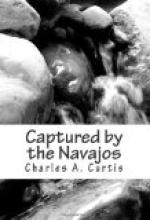“That is the great chief, El Ebano,” cried the elder Cordova, as he put his gun to his shoulder. Taking careful aim at the gray-haired leader, he fired, and one of the most famous chieftains of the Navajos rolled from his saddle. The beautiful black horse he had been riding ran on towards us. With El Ebano dead, the Indians were dismayed. A moment later they were in full retreat, and joined their comrades who had stolen our cattle.
* * * * *
Our casualties were few. Sergeant Cunningham’s scalp had been grazed along the left side, Private Tom Clary had the lobe of an ear cut, Privates Hoey and Evans were wounded along the ribs, and Corporal Frank Burton had a bullet wound in the right shoulder.
The Indians had gathered in a compact body about three miles to the southward, evidently holding a council of war. Reflecting that they would not be likely to repeat their attack immediately, I walked out with the first sergeant and a few of the men to note what casualties had befallen the enemy, and learn if there were any wounded men in need of assistance.
As I neared the place where the charge had been checked, I met Corporal Frank Burton leading a black pony, gently stroking his nose and talking soothingly to him, while the animal seemed half divided between fear and newly awakened confidence.
“Oh, isn’t he a beauty, sir!” exclaimed the boy—“isn’t he just a perfect beauty!”
“He certainly is a very handsome horse,” I answered, after walking around him and taking in all his graces and points. “Take him to the stable and we will see to what use we can put him.”
“Do you think it would be possible for me to own him, sir?” inquired the boy, in an anxious voice.
“As spoil of war, corporal?”
“I suppose so, sir. I was first to capture him, you know.”
Before I could reply to this we were startled by a loud whinny, a little to the north, which was promptly answered by the black, and, looking in that direction, we saw a cream-colored pony, with high-erected head, looking anxiously in the direction of our captive.
“That seems to be a friend of your pony’s,” I said.
“Another beauty, too, sir! Can’t we catch it for Henry?”
“Perhaps we can. It seems inclined to stay by this one. I see all the other loose ponies have joined the Indians. But wait now until we look over the field.”
We now turned our attention to the prostrate bodies of the fallen enemy. All were dead.
The body of El Ebano, clad in black buck-skin, ornamented with a profusion of silver buttons, chains, and bracelets, lay face upward, his resolute, handsome countenance still in the embrace of death. I told the men we would give him and his comrades a warrior’s burial on the morrow, and returned to camp to make it defensible against a possible night attack.
The advantage of numbers was decidedly on the side of the Indians, and I felt if they could show the firmness and dash of white men our chances of repelling a resolute attack were small. Counting the Mexicans and the boys, we numbered but forty-eight, to their three hundred or more.




